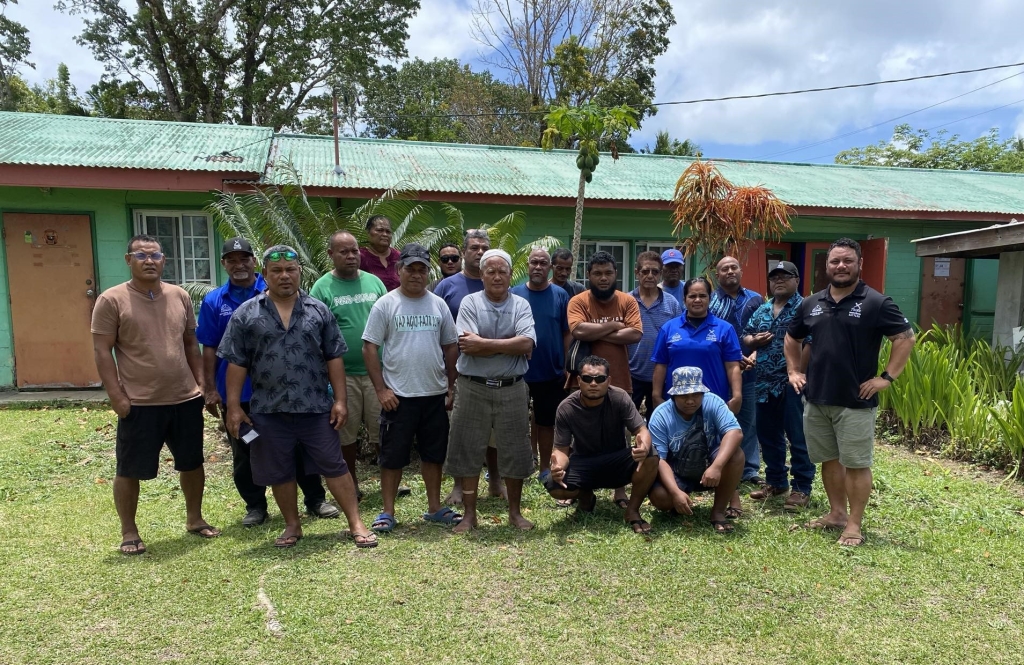
29 May 2024, Yap FSM - Invasive species have significant negative impacts on local biodiversity and ecosystems and managing them is essential for maintaining the health and stability of natural environments while also building the resilience of communities against climate change and preserving Pacific Islands cultural and natural heritage.
This was echoed by the participants of the Federated States of Micronesia (FSM) joint stakeholder consultation with the Secretariat of the Pacific Regional Environment Programme’s (SPREP) Pacific Regional Invasive Species Management Support Service (PRISMSS), held on 28 May 2024.
The consultation with Yap and Kosrae State representatives determined priority actions to address invasive species threats to FSM through the War On Weeds (WOW) and Resilient Ecosystems - Resilient Communities (RERC) Programmes.
Both Yap and Kosrae identified the eradication of high-risk species, African tulip tree (Spathodea campanulata) and Leuceana (Leucaena leucocephala) respectively as their priority actions for the next two years under the WOW Programme. These species being still at low incidence in Yap and if left unmanaged, can significantly transform, or change the character, condition, form, or nature of ecosystems over a substantial area, threatening local biodiversity and ecosystem structure.
Chief of Agriculture and Forestry for Yap, Mr. Tamdad Sulog, stated, “We have already successfully eradicated two high risk species, Imperata grass (Imperata cylindrica) and chain of love (Antigonon leptopus), from Yap in 2019, and with additional resources that will be provided to Yap under the PRISMSS-Restoring Island Resilience project, we are confident we are in a better position to repeat the same success story with eradicating African tulip tree”.

Kosrae State representatives having identified the Leucaena leucocephala as their target species for removal under the WOW Programme, also wanted to protect the integrity of the island’s historic Lelu Ruins Park through the RERC Programme.
The Lelu ruins hold immense cultural value to the local communities and offer insights into the ancient Kosraean civilisation and Micronesia's rich cultural heritage. Their objective is to remove all invasive weeds such as Merremia, Chromolaena, Mikania, as well as predators such as rats and invasive lizards from the site. By restoring the ecological values of the site, this will strengthen the site’s structure and preserve its history, ensuring its legacy will live on for future generations, aligning it with the broader goals of climate adaptation and resilience-building.
As part of the four-day consultation, a basic training delivered by the regional 2019 Battler Of The Year award recipient ,Yap’s Invasive Species Coordinator Mr. Francis Liyeg, on the safe use of herbicides. This was provided to assist the Kosrae team to manage priority invasive weeds in Kosrae.
Director for Kosrae’s Island Resource Management Authority (KIRMA), Mr Steven Palik, said, “We have learned a lot about what PRISMSS does from this consultation, especially the WOW and RERC programmes, and I hope we can get the opportunity to engage with the other PRISMSS programmes to manage widespread weeds in Kosrae.
“One of our priority needs right now is for additional human resources to carry out on-the-ground management activities and facilitate the involvement of communities in invasive species management to ensure that our communities are aware of the impacts invasive species can cause to their livelihoods, their traditional knowledge and heritage.”
SPREP Invasive Species Adviser, Mr. David Moverley sees this new development, from the two States, as a positive example of what collaboration looks like in the Pacific. “Yap is one of the few Islands in the Pacific that has managed to eradicate priority invasive weeds successfully. This is a reflection of their level of awareness of the importance of managing invasive species and their commitment to getting it done. This sets a positive challenge and standard for other FSM states such as Kosrae to contribute to FSM’s success story as a nation.”
The implementation of these activities is expected to begin in July 2024. Funded by the New Zealand Government under the PRISMSS Restoring Island Resilience (RIR) Project, these initiatives will provide technical support and resources needed to assist local practitioners in battling invasive species to improve Pacific Island countries livelihoods and resilience to climate change by reducing the impact of invasive species on natural and agricultural ecosystems.
PRISMSS-Restoring Island Resilience is a New Zealand-PRISMSS collaboration project that aims to improve Pacific Island Countries and territories livelihoods and resilience to climate change by reducing the impact of invasive species on natural and agricultural ecosystems through the five PRISMSS Programmes.
For further information on PRISMSS, please visit https://www.sprep.org/invasive-species-management-in-the-pacific/prismss